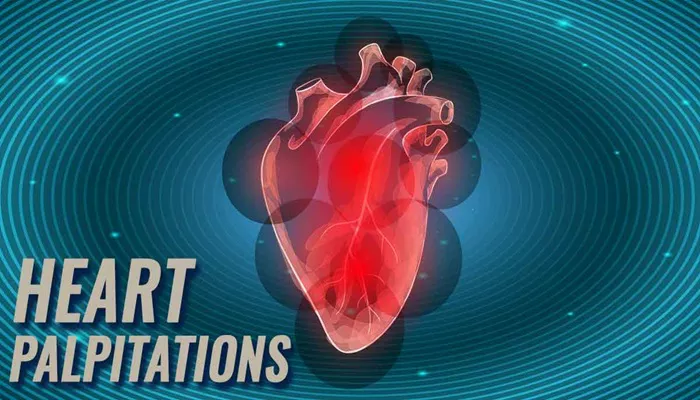Heart palpitations are sensations that make you feel as though your heart is pounding, fluttering, or beating irregularly.
They can occur in various situations and are often benign, but they can also signal underlying health issues. This article delves into the causes of abnormal heart palpitations, providing a comprehensive overview of the conditions and factors that may contribute to this phenomenon.
What Are Heart Palpitations?
Palpitations are defined as the awareness of one’s heartbeat, which may feel faster, harder, or irregular. They can manifest as:
Racing or pounding: A sensation of a rapid heartbeat.
Fluttering: A feeling of the heart skipping beats or having extra beats.
Thumping: An awareness of the heart’s forceful contractions.
These sensations can be felt in the chest, throat, or neck and may occur at rest or during physical activity. While palpitations can be alarming, they are often harmless and temporary. However, persistent or severe palpitations warrant medical evaluation to rule out serious conditions.
Common Causes of Abnormal Heart Palpitations
Abnormal heart palpitations can arise from various physiological and psychological factors. Below are the primary categories of causes:
1. Cardiac Conditions
Certain heart-related issues can lead to palpitations:
Arrhythmias: These are irregular heartbeats that can cause sensations of fluttering or racing. Common types include:
Atrial fibrillation: A rapid and chaotic heartbeat originating in the atria.
Supraventricular tachycardia (SVT): An abnormally fast heartbeat starting above the ventricles.
Ventricular tachycardia: A fast heart rate due to issues in the ventricles.
Heart valve disorders: Conditions such as mitral valve prolapse can lead to abnormal heart rhythms.
see also: What Recreational Drug Causes Cardiac Arrhythmia?
Cardiomyopathy: This refers to diseases of the heart muscle that affect its size and shape, potentially leading to arrhythmias.
Coronary artery disease: Reduced blood flow to the heart muscle due to blocked arteries can trigger palpitations.
Heart failure: This condition affects the heart’s ability to pump blood efficiently, potentially causing irregular rhythms.
2. Non-Cardiac Medical Conditions
Several non-cardiac health issues can also result in palpitations:
Hyperthyroidism: An overactive thyroid gland increases metabolism and heart rate, leading to palpitations.
Anemia: Low red blood cell counts reduce oxygen delivery to tissues, prompting the heart to work harder.
Low blood sugar (hypoglycemia): When blood sugar levels drop significantly, adrenaline is released, which can increase heart rate.
Fever: Elevated body temperature can accelerate metabolism and heart rate.
Electrolyte imbalances: Abnormal levels of potassium, magnesium, or calcium can disrupt normal electrical signaling in the heart.
3. Psychological Factors
Emotional states play a significant role in triggering palpitations:
Anxiety and stress: High levels of anxiety or panic attacks often lead to heightened awareness of heartbeat and increased heart rate.
Depression: This mental health condition can also manifest physically through palpitations.
4. Lifestyle Factors
Certain lifestyle choices and habits can contribute to abnormal heart rhythms:
Caffeine intake: Stimulants found in coffee, tea, energy drinks, and chocolate can lead to increased heart rates and palpitations.
Nicotine use: Smoking or using nicotine products stimulates the nervous system and raises heart rate.
Alcohol consumption: Excessive drinking can lead to “holiday heart syndrome,” where binge drinking causes temporary arrhythmias.
Recreational drugs: Substances like cocaine and amphetamines significantly increase heart rate and may cause dangerous arrhythmias.
5. Medications
Some medications may have side effects that include palpitations:
Decongestants: Medications containing pseudoephedrine can stimulate the heart.
Diet pills: Some weight-loss medications contain stimulants that may lead to increased heartbeat.
Asthma medications: Certain inhalers may cause palpitations as a side effect.
6. Hormonal Changes
Hormonal fluctuations can also influence heart rhythm:
Menstrual cycle changes: Hormonal variations during menstruation may lead to palpitations in some women.
Pregnancy: Increased blood volume and hormonal changes during pregnancy can cause more frequent palpitations.
Menopause: Hormonal shifts associated with menopause often lead to episodes of palpitations.
Diagnosis of Heart Palpitations
When evaluating abnormal heart palpitations, healthcare providers typically follow a systematic approach:
Medical History Review:
Patients will be asked about their symptoms, including frequency, duration, triggers, and associated symptoms (e.g., dizziness or chest pain).
Physical Examination:
A thorough examination helps assess overall health and identify any signs of cardiovascular issues.
Diagnostic Tests:
The following tests may be conducted:
Electrocardiogram (ECG): Measures electrical activity in the heart.
Holter monitor: A portable ECG worn for 24 hours or longer to capture intermittent arrhythmias.
Echocardiogram: An ultrasound test that visualizes the structure and function of the heart.
Blood tests to check for anemia, electrolyte imbalances, thyroid function, etc.
Treatment Options
Treatment for abnormal heart palpitations depends on their underlying cause:
Lifestyle Modifications:
Reducing caffeine and alcohol intake.
Quitting smoking.
Managing stress through relaxation techniques such as yoga or meditation.
Medication Management:
If an arrhythmia is diagnosed, medications like beta-blockers or antiarrhythmic drugs may be prescribed.
Addressing underlying conditions (e.g., treating hyperthyroidism) may alleviate symptoms.
Procedures:
In cases where medication is ineffective or inappropriate, procedures such as catheter ablation may be recommended to correct arrhythmias.
Implantable devices like pacemakers may be necessary for patients with significant rhythm disturbances.
When to Seek Medical Attention
While many instances of palpitations are benign, certain situations require immediate medical evaluation:
Palpitations accompanied by chest pain or tightness.
Shortness of breath or dizziness.
Fainting spells or near-fainting episodes.
In these cases, prompt medical attention is crucial for assessing potential serious conditions such as arrhythmias or cardiac events.
Conclusion
Abnormal heart palpitations are common experiences that range from benign occurrences related to lifestyle factors to serious manifestations of underlying cardiac conditions. Understanding the various causes—from cardiac issues like arrhythmias and valve disorders to non-cardiac factors such as anxiety and medication side effects—can empower patients to seek appropriate care when necessary.
Related topics:
- How to Get Rid of Arrhythmia Naturally?
- What Is Junctional Arrhythmia?
- How to Read Sinus Arrhythmia ECG?

